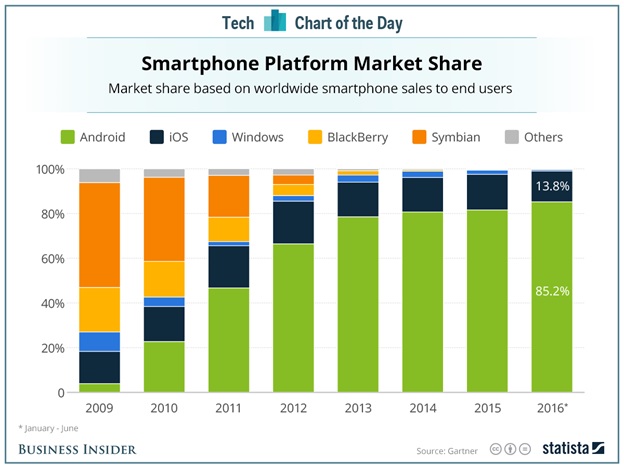
Over the years, we have talked about the famous marketing book of the ‘80s – “The 22 Immutable Laws of Marketing” – in this blog and how it has helped shape radio broadcasting strategy. Written by the famous positioning gurus, Al Ries and Jack Trout, this little handbook became a Holy Grail for marketers, programmers, and strategists. In fact, the subtitle of the book was “Violate them at your own risk!”
I think you can start violating most of them. Maybe all of them. Because in the disruptive Internet Era that has eaten the world, all bets are off. If you doubt me, look at Ries and Trout’s very first immutable law that sets the tone for their entire list:
The Law of Leadership, which stated that it’s better to be first in a category than best in that category.
Many category killers have made their living based on this axiom that getting there first makes up for a litany of vulnerabilities. And that being first makes it oh-so-difficult for competitors to take you down. That may have been the case for General Motors, Kodak, and Woolworths back in the 1960s, but in today’s world, being better is better than being first.
It’s become even easier to knock off the market leader. Just ask Marissa Mayer who will soon be departing Yahoo! as it is being prepared for sale to Verizon later this year. Before there was Google, there was Yahoo! and Lycos and Netscape – all of whom beat Google to market. But we barely remember these earlier search engines because Google has left them in its dust.
 That pretty much sums up the smartphone race as well. Business Insider recently published this Statista/Gartner chart that shows the two-horse race dominated by Apple (iOS) and Google (Android). Combined, they now control better than 99% of the smartphone market. (Note this is worldwide and not the U.S.).
That pretty much sums up the smartphone race as well. Business Insider recently published this Statista/Gartner chart that shows the two-horse race dominated by Apple (iOS) and Google (Android). Combined, they now control better than 99% of the smartphone market. (Note this is worldwide and not the U.S.).
But it wasn’t always this way. Just a few short years ago, market leader BlackBerry pretty much owned the space. As you can see on the chart back in 2009 – just seven years ago – BlackBerry held more than 40% of the market while Android was just getting going. All the other players, including Microsoft and their Windows phone, are gone.
In BlackBerry’s case, they believed that immutable law. One of the most memorable quips was uttered by Research In Motion co-founder,  Mike Lazaridis, who “dismisses the idea that RIM can be beaten in the market it practically created.” He no doubt carried around an autographed copy of “The 22 Immutable Laws.”
Mike Lazaridis, who “dismisses the idea that RIM can be beaten in the market it practically created.” He no doubt carried around an autographed copy of “The 22 Immutable Laws.”
So it’s time to put down the Ries and Trout book and get serious about the transience of dominance. These days, it’s elusive and often short-lived, and for that we have the Internet and the innovation it has spawned to thank.
One of the things we’ve learned in spades during last decade or so is that market leaders have no lock on owning the market. When startups can pop up and become players virtually overnight, disruption and “the new new thing” trump familiarity and loyalty.
This is why Mark Zuckerberg continues to push Facebook so hard. His awareness of his competition and what he needs to do to stay on top is as good as we’ve seen from a CEO in any business sector. And you have to believe Zuckerberg remembers only too well how his social network toppled the once-mighty Myspace.
Pandora – about to launch its own streaming service – is a good example of what can happen to a market leader that fails to tap into the changing demands of the consumer, as playlist services like Spotify have forced Westergren and company to alter their model and respond.
 For radio stations, the speed at which loyalties change must be respected. As any veteran of the business knows only too well, a new competitor can co-opt a playlist or steal a popular personality and wreak havoc in a heartbeat. That doesn’t necessarily mean a Blockbuster or Yahoo! ending, but it suggests that success can be fleeting.
For radio stations, the speed at which loyalties change must be respected. As any veteran of the business knows only too well, a new competitor can co-opt a playlist or steal a popular personality and wreak havoc in a heartbeat. That doesn’t necessarily mean a Blockbuster or Yahoo! ending, but it suggests that success can be fleeting.
For radio as in industry, it’s a reminder that all those decades of service, consistency, and loyalty count for something. But today’s consumers are looking for value, convenience, quality, entertainment, and surprise – not necessarily in that order. Even stations that find themselves on top of the Nielsen charts must sleep with one eye open in world where leaders can be easily be BlackBerried.
And that’s why Ries and Trout’s 20th law might still be worth considering: The Law of Success, which states that winning often leads to arrogance and arrogance leads to failure. Just being the market leader doesn’t translate to knowing what a changing market wants. If you think this law contradicts The Law of Leadership, well, that’s the way the marketing cookie crumbles.
So maybe those two savvy authors actually managed to have it both ways with “The 22 Immutable Laws.”
Unfortunately, none of us slugging it out in today’s marketplace have that luxury.
Leadership is fleeting.
It is better to be better than it is to be first.
- Why “Dance With Those Who Brung You” Should Be Radio’s Operating Philosophy In 2025 - April 29, 2025
- The Exponential Value of Nurturing Radio Superfans - April 28, 2025
- What To Do If Your Radio Station Goes Through A Midlife Crisis - April 25, 2025




Curious as to what Jack and Al think. You guys should reach out to them for their thoughts on this front. I am with you on the Immutable Laws, and a few other things. I still think they nailed it with “Focus.” I see it still true as I watch even the ascending market leaders losing focus.
Mark Zuckerberg is not a case in point. While it seems he is diversifying, I think he is not really doing that. I think his is more evolutionary shifting in the sand to be where people are saying they want to be. That’s the cool thing about Facebook. We hear so often that “that’s not what the kids use.” Even my daughter says it’s so old-fashioned (like email), and yet Facebook’s dominance continues to mystify. I think the mystification is because people are not noticing how they mold and shape. Instead, we complain how things are different on Facebook, and we don’t like the changes they make. Is it we who are old-fashioned?
Thanks, as always!
Chris, I’m sure Jack and Al have an updated version along the lines of new laws for a new media world. They’ve always managed to capture the marketing mantra of the moment. And I say that very respectfully.
As for Zuckerberg, I think it goes beyond diversification. He is playing to keep Facebook on top, whether it’s enhancing and expanding the service, the big move to mobile, and the purchase of Instagram. Keeping a leader relevant, hungry, and innovative is where his focus seems to be.
Thanks, as always, for the conversation and the comment, and for reading our blog.
Exactly! You were far more precise and concise in what I said about Facebook. That’s what I really meant.
Thanks for putting these thoughts out there. They do help me stay focused.
🙂
I do not see an updated version of this book. Can you provide a link, please? Thank you
Tony Robbins said it many years ago and it’s still true today- it’s all about “Constant and Never Ending Improvement- CANI ! ” That philosophy is so much apart of the 18 companies he owns that his workers and leaders have captured the spirit of Anticipation of where his companies need to be for their clients.
John, that’s a great way of looking at it…and something tells me David Field would wholeheartedly agree! Thanks for chiming in.